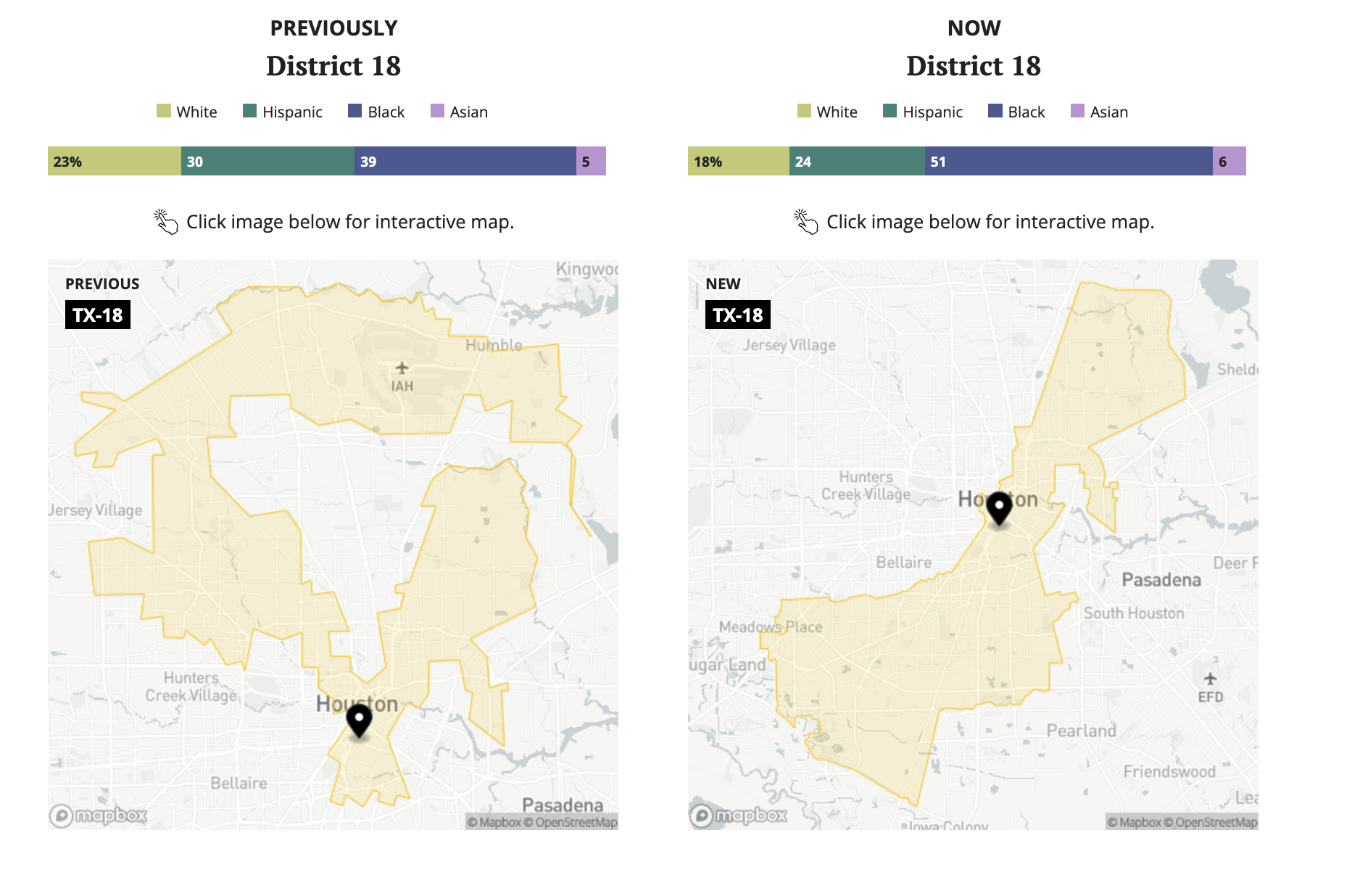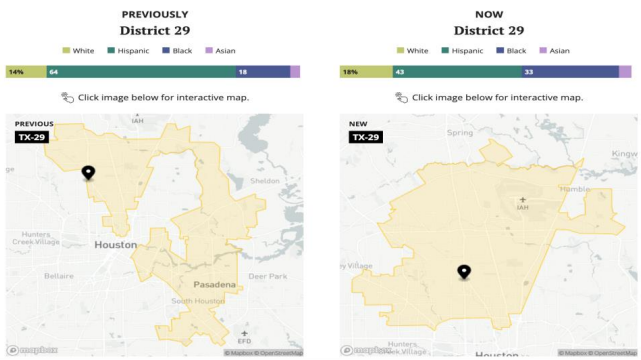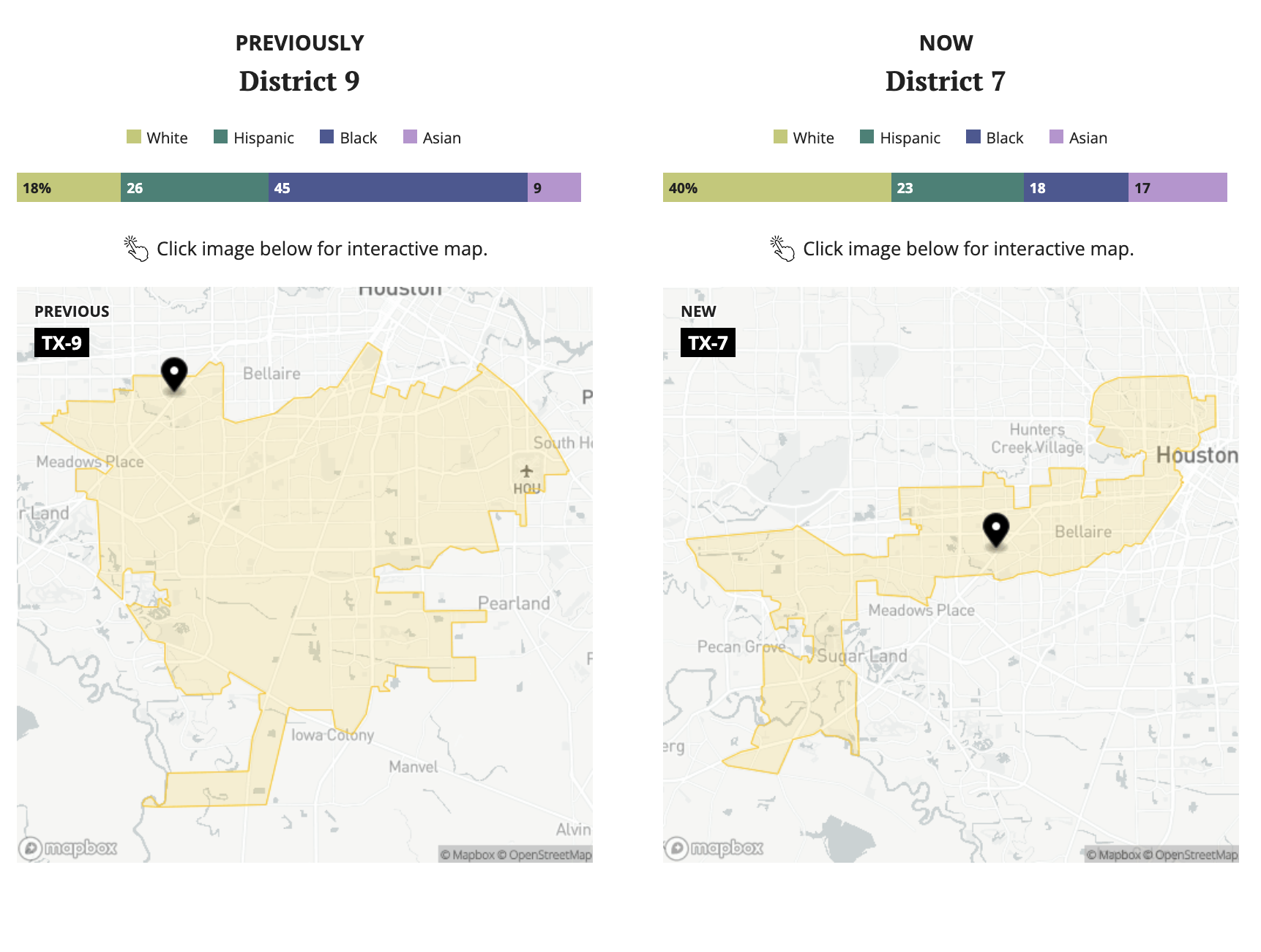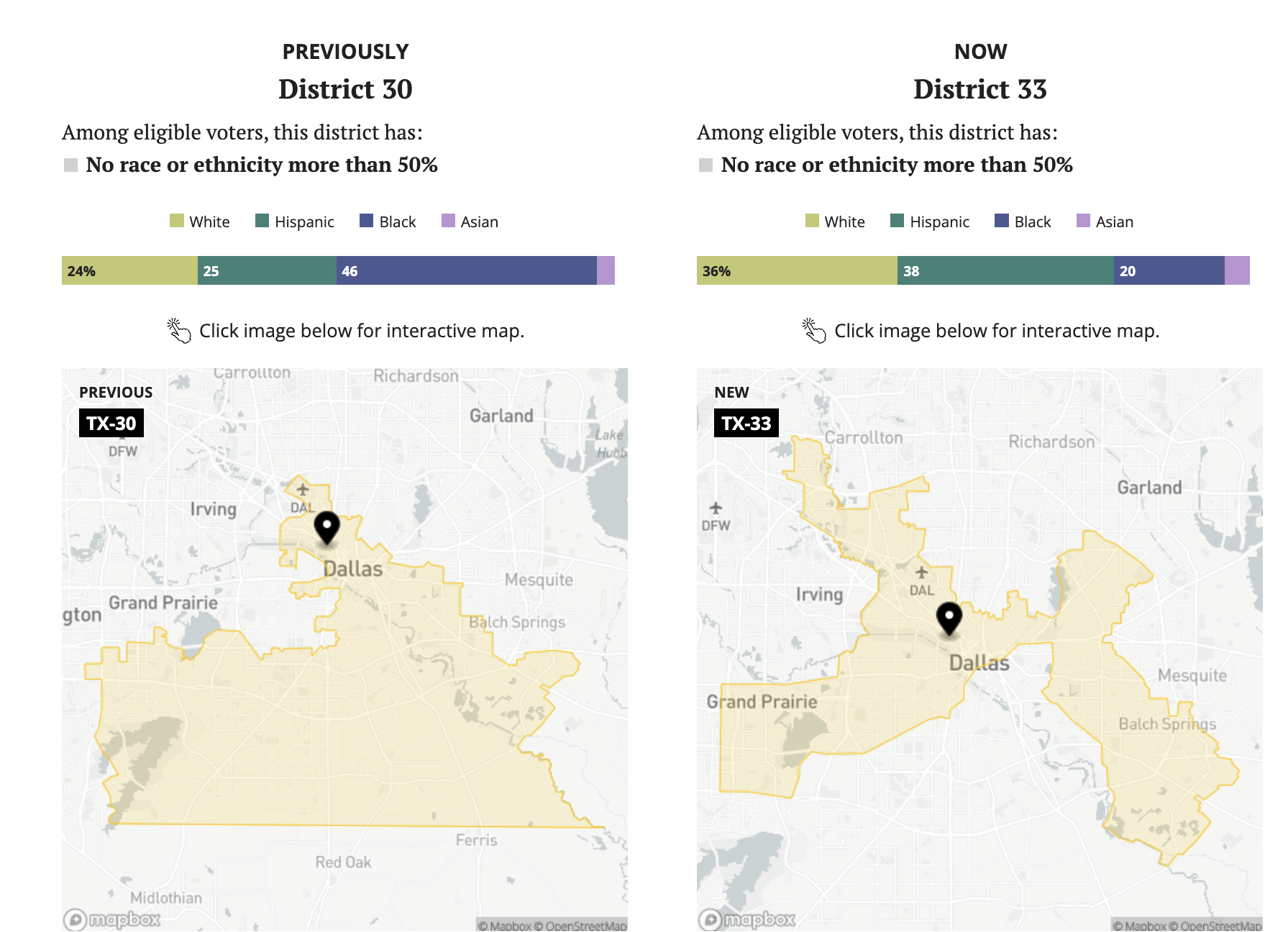1. Introduction
1.1. Research background and topic
In America, every ten years, swing states, which normally contains a lot of floating population that hugely effect the effectives of the election vote, like Texas, will undergo redistricting once to adjust bounties of each district base on their census. The purpose was to maintain political balance from making as much of the district fair as possible.
However, nowadays, redistricting had changed it purpose into serves parties’ gerrymandering, which completely destroyed the original "one person, one vote" idea in The Voting Right Act [1]. Texas, a growing Republican stronghold, has 25 out of 38 congressional seats held by Republicans in 2025. Former President Donald Trump had clearly expressed his thought of Republicans should redraw maps to win an additional five seats.
The Republican strategy employs "packing" to consolidate Democratic voters into fewer districts, thereby converting several competitive districts into secure Republican seats without changing the total number of seats. This paper focuses on identifying the districts transformed in favor of Republicans and examining surrounding political impacts.
1.2. Research purpose and significance
Current research has limitation, firstly on loose information due to the fact that it has just yet happened. Apart from this, media reports often carry political biases, potentially influencing conclusions and public perception. This study seeks to mitigate these biases through comprehensive data collection and objective analysis, providing reliable insights into the 2025 Texas redistricting.
1.3. Research methods and framework
In this article, the author will collect as much quantitative data from a diverse range of sources as possible. Compiling that information in chronological and abbreviated analysis is helpful to mitigate partisan bias and improve the reliability of this article. This essay will be structured through a recent case study, examining Texas redistricting, different parties, and their changes in of legal institution and map changes the fairness of voting. Therefore, specific data of the population of the human race in different districts of Texas will be provided for analysis.
At the end of September 2025, the Gallup poll had concluded that trump’s approval rating was at a rock bottom of 37%. In other words, the republicans earned 219 seats majority in the 435-seat House of Representatives in the midterm races [2]. The changes would be risky for the strength of the mid-term election for republicans. On August 20, 2025, the Texas State House passed congressional maps that would target five Democratic-held seats. The vote was 88–52, a party-line vote. The Congressional map targets Marc Veasey, Greg Casar, Lloyd Doggett, Julie Johnson, and Al Green [3].
2. Packing democratic voters
From all the data being reviewed and analyzed, Houston, as one of the most important counties in Texas for Democrats, contains fairly and representable changes in district and data to support the final claim. In the last general election, Kamala Harris, representing the Democrats, received 51.82% support rate, while Donald Trump, representing the Republican, 41.51% [4]. Although the percentage is compatible, Houston has been a Democrats preferred county for comparatively long years. In other words, it is still fairly to say most people in Houston are inclined to Democrats.


Figures 1 and 2 show the changed maps in Houston districts 18 and 19 and the changes in their ethnic numbers. Here, we can see that the number of black people in both districts has increased significantly. The former has increased by 12 percent, and the latter by 15 percent [5,6]. In the 2024 general election figures, we can see that the black community voted "Republican" last year, accounting for only 12% of the total population [5]; that is to say, this group of them is more inclined towards Democrats. Such an increase proves the previous inference that the population of Democrats is being packed together.
3. Cracking republican voters


Another situation is that there is a significant improvement in whites and Hispanics (Figure 3 and Figure 4). In the data of last year's general election, white people had a 56% support rate for "Republican". In recent years' general elections, the majority of the population in this state has chosen "Republican", which indicates that there is still much room for improvement in this figure. Also in last year's general election, the Hispanic population gave 42 percent support to the Republicans. The combination of the two was at a disadvantage in the previous election (44% of the total), but it still managed to secure many votes (63% of the total). In other words, this district has changed into Republican, which is beneficial to President Donald Trump because his party gets one more seat in his party [6-8].
Apart from this, another clue that should be noticed is that the district 9 in figure 2 is represented by U.S. Rep. It is possible to guess that the redistricting location let his power transfer into district 7, so as a democrat, it favored him in the district position.
The same location in Dallas changed from District 30 to District 33. From being an advantage for the Democrats to becoming an advantage for the Republicans, because over 50 percent people of their race (White, and Hispanic added up is 74 percent), while the previous map had only 49 percent, and this indicate district 33 right now more prefer the Republican [6,9,10].
4. Conclusion
4.1. Summary of finding
In conclusion, the figures and data been provided help this article to conclude that the republicans try to reinforce their political ability through using gerrymandering to pack districts in democrats votes in some places and crack the other uncertain and some democrats to get more votes and gain more advantage.
Additionally, apart from districts exhibiting a marked shift in stance, alterations elsewhere were minimal or failed to alter any party's voter base by more than 50% or reduce it below 50%. In other words, only those areas experiencing substantial changes warrant genuine research significance and constitute effective analysis. This indirectly corroborates the validity of the conclusion.
4.2. Research limitation
It must be admitted that this study is written right after the event and before the 2026 midterm elections happen. Therefore, conclusions cannot yet be validated accurately by election outcomes. In other words, it can only be deemed as a preliminary assessment base on provident data, and it is possible the reality can have a different conclusion from this.
4.3. Future directions
Similar analyses can be applied to other states undergoing redistricting, such as California's forthcoming adjustments. As President Donald Trump signaled plans to promote similar strategies nationally, ongoing political conflict over redistricting is expected. Understanding these dynamics helps citizens engage with electoral fairness issues impacting their representation.
References
[1]. Cornell Law School. (2024). Voting Rights Act. LII / Legal Information Institute. https: //www.law.cornell.edu/wex/voting_rights_act
[2]. Osgood, B. (2025). What’s the Texas redistricting fight about, and how has California reacted? Al Jazeera. https: //www.aljazeera.com/news/2025/8/21/whats-the-texas-redistricting-fight-about-and-how-has-california-reacted
[3]. Edelman, A., et al. (2025). Map: How Texas congressional districts would change under Republicans’ new proposal. NBC News. https: //www.nbcnews.com/politics/2026-election/map-texas-congressional-districts-change-republicans-new-proposal-rcna221953
[4]. Martínez, J. L. (2024). Use our map to see where Donald Trump and Kamala Harris got the most votes in Harris County. Houston Landing. https: //houstonlanding.org/use-our-map-to-see-the-highest-support-areas-in-harris-county-for-donald-trump-kamala-harris/
[5]. Pew Research Center. (2024). Partisanship by race, ethnicity and education. Pew Research Center – U.S. Politics & Policy. https: //www.pewresearch.org/politics/2024/04/09/partisanship-by-race-ethnicity-and-education/
[6]. Astudillo, C. (2025). Texas redistricting 2025: Find your new district. The Texas Tribune. https: //www.texastribune.org/2025/09/04/2025-texas-redistricting-maps/
[7]. The NPR Network. (2025). The fight is on. How redistricting could unfold in 8 entangled states. NPR. https: //www.npr.org/2025/08/14/nx-s1-5501537/texas-california-gerrymandering-redistricting
[8]. Madden, M. (2025). CA lawmakers’ new congressional maps are almost ready amid Texas redistricting showdown, sources say. ABC7 San Francisco. https: //abc7news.com/post/california-lawmakers-working-new-congressional-maps-are-almost-ready-response-texas-gop-redistricting-sources-say/17434605/
[9]. Texas Legislative Council. (2025). DistrictViewer. https: //dvr.capitol.texas.gov/Congress/2/PLANC2193
[10]. Levitt, J. (2020). Where are the lines drawn? All About Redistricting. https: //redistricting.lls.edu/redistricting-101/where-are-the-lines-drawn/
Cite this article
Liu,Z. (2025). Power Games in Redistricting: Analysis on the 2025 Republican Redistricting in Texas. Advances in Economics, Management and Political Sciences,224,113-118.
Data availability
The datasets used and/or analyzed during the current study will be available from the authors upon reasonable request.
Disclaimer/Publisher's Note
The statements, opinions and data contained in all publications are solely those of the individual author(s) and contributor(s) and not of EWA Publishing and/or the editor(s). EWA Publishing and/or the editor(s) disclaim responsibility for any injury to people or property resulting from any ideas, methods, instructions or products referred to in the content.
About volume
Volume title: Proceedings of ICFTBA 2025 Symposium: Data-Driven Decision Making in Business and Economics
© 2024 by the author(s). Licensee EWA Publishing, Oxford, UK. This article is an open access article distributed under the terms and
conditions of the Creative Commons Attribution (CC BY) license. Authors who
publish this series agree to the following terms:
1. Authors retain copyright and grant the series right of first publication with the work simultaneously licensed under a Creative Commons
Attribution License that allows others to share the work with an acknowledgment of the work's authorship and initial publication in this
series.
2. Authors are able to enter into separate, additional contractual arrangements for the non-exclusive distribution of the series's published
version of the work (e.g., post it to an institutional repository or publish it in a book), with an acknowledgment of its initial
publication in this series.
3. Authors are permitted and encouraged to post their work online (e.g., in institutional repositories or on their website) prior to and
during the submission process, as it can lead to productive exchanges, as well as earlier and greater citation of published work (See
Open access policy for details).
References
[1]. Cornell Law School. (2024). Voting Rights Act. LII / Legal Information Institute. https: //www.law.cornell.edu/wex/voting_rights_act
[2]. Osgood, B. (2025). What’s the Texas redistricting fight about, and how has California reacted? Al Jazeera. https: //www.aljazeera.com/news/2025/8/21/whats-the-texas-redistricting-fight-about-and-how-has-california-reacted
[3]. Edelman, A., et al. (2025). Map: How Texas congressional districts would change under Republicans’ new proposal. NBC News. https: //www.nbcnews.com/politics/2026-election/map-texas-congressional-districts-change-republicans-new-proposal-rcna221953
[4]. Martínez, J. L. (2024). Use our map to see where Donald Trump and Kamala Harris got the most votes in Harris County. Houston Landing. https: //houstonlanding.org/use-our-map-to-see-the-highest-support-areas-in-harris-county-for-donald-trump-kamala-harris/
[5]. Pew Research Center. (2024). Partisanship by race, ethnicity and education. Pew Research Center – U.S. Politics & Policy. https: //www.pewresearch.org/politics/2024/04/09/partisanship-by-race-ethnicity-and-education/
[6]. Astudillo, C. (2025). Texas redistricting 2025: Find your new district. The Texas Tribune. https: //www.texastribune.org/2025/09/04/2025-texas-redistricting-maps/
[7]. The NPR Network. (2025). The fight is on. How redistricting could unfold in 8 entangled states. NPR. https: //www.npr.org/2025/08/14/nx-s1-5501537/texas-california-gerrymandering-redistricting
[8]. Madden, M. (2025). CA lawmakers’ new congressional maps are almost ready amid Texas redistricting showdown, sources say. ABC7 San Francisco. https: //abc7news.com/post/california-lawmakers-working-new-congressional-maps-are-almost-ready-response-texas-gop-redistricting-sources-say/17434605/
[9]. Texas Legislative Council. (2025). DistrictViewer. https: //dvr.capitol.texas.gov/Congress/2/PLANC2193
[10]. Levitt, J. (2020). Where are the lines drawn? All About Redistricting. https: //redistricting.lls.edu/redistricting-101/where-are-the-lines-drawn/









